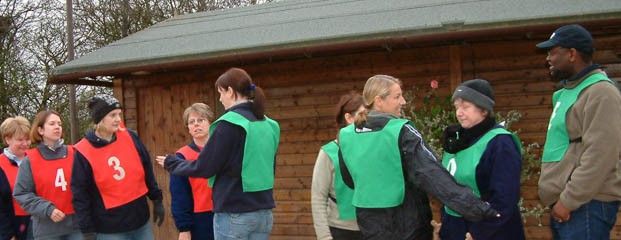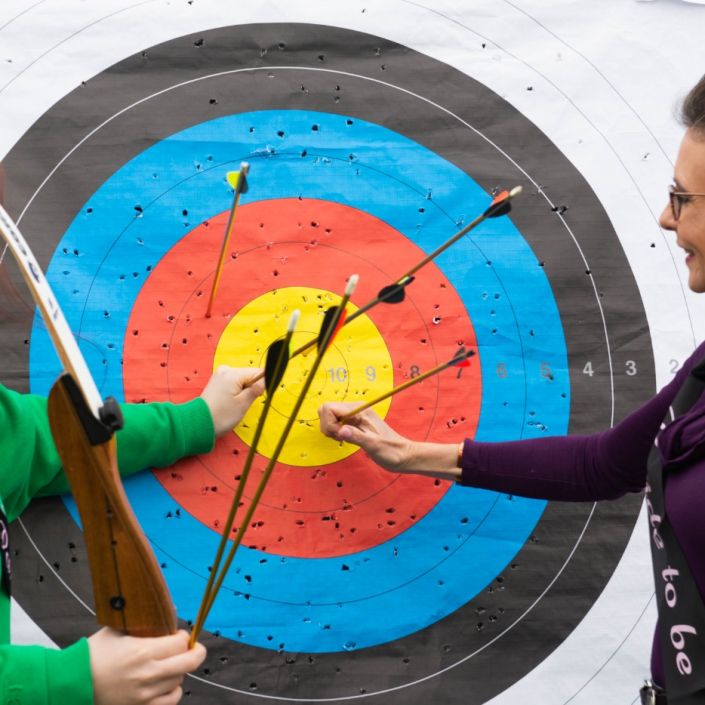A team bonding event will certainly encourage guests to get to know each other and break down barriers. In many cases this will not be enough to create a better team. There may be deep rooted issues that need a more focused approach.
We see many groups each year who are looking for a 'Team Building Magic Wand' that will cure all of the problems a team has. We don't profess to own such a magic wand but we can help teams to become more 'self aware' of issues that can cause problems. If a team is aware of potential issues they can predict and avoid them or handle them more effectively.
What are the Common Problems Within a Team?
Virtually every team building session that we run will illustrate shortfalls in how teams operate. Common issues include:
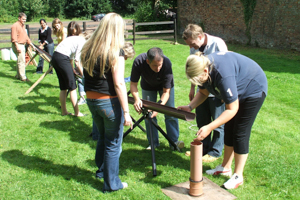
- Ineffective Communication
- Insufficient experience in working as a team
- Team members lacking confidence within a team
- Leadership / leaderless problems
A suitable team development event can help to identify and address these deeper issues and steer the team towards better practice. They are often powerful because they are run by personnel outside of the normal team – they are not bogged down with presumptions or the teams routines. The facilitator can provide a fresh pair of eyes to assess the group and pass unbiased comment on both positive and negative aspects.
Simply raising the awareness of these qualities can be enough to change how a team works.
Practical Team Development Events
The most effective team development events are often based around a problem / challenge that the team has to overcome. Observing how the team tackles the situation will expose strengths and weaknesses and will allow issues to be raised and discussed.
There are a wide range of "ropes, planks and barrels" activities that provide an ideal platform to test a team and allow modifications to be made. Many are based around military "Command Tasks" that are used to assess the leadership ability of potential officers. The tasks are generally made less physically challenging to make them more suitable for the average corporate team.
Using a series of short problems will allow the team to be observed a number of times. An experienced facilitator will be able to pick out problems and provide feedback to the team after the task.
Planning a Team Development Event
A few pointers to those planning a team development event:
Venue
Tasks can be taken to a wide variety of locations / venues including hotels, conference centres and sports fields providing good flexibility.
Duration
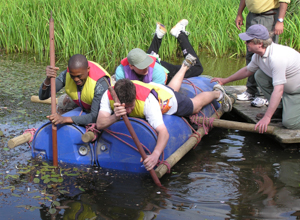
A team will need to tackle several tasks to allow useful feedback to be made. A typical session will be a half or full day.
How Challenging?
Ensure the tasks aren't too tough. Crossing a river using a few oil drums and wooden poles in the middle of winter won't appeal to many people and may do more damage than good. Everyone in the team should be able and willing to take part.
The Task Isn't The Main Thing!
The tasks are not the important part! If the observer is concentrating on the technicalities of the task they are missing the point. It doesn't really matter that the team don't know how to lash two bits of wood together – they won't need to do this in the workplace (probably). The benefit of a problem solving challenge is its ability to allow observation and analysis of the teams inter-actions and ultimately its performance.
Relate Back to The Work Place
The observer must be able to relate any learning points back to the work place. A team who manage to cross a swamp using planks and ropes may have succeeded at the task, but they may not see the relevance of their efforts. A good observer will highlight the teams:
- Problem solving process
- Time management
- Organisation of the team
- Ability to change their plan when the situation changed
- Motivation to get a job done.
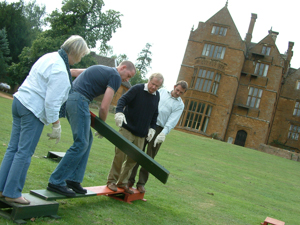
DIY Event
The observer is the key person in the success and usefulness of the event. Doing the job yourself is unlikely to work as you will be drawn into the task and forget about what the event is actually about. Use a professional organisation that knows the tasks well and has experienced instructors who have the ability to link the tasks back to the work environment.
Belbin, Myers Briggs, Tuckman ....
Don't get too distracted with theories and models. Many trainers are very keen to use a certain model to show how an ideal team should operate or to analyse the personality types of the team members.
Most of the well known models require the trainer to pay an annual subscription or licence fee – if they are paying for a system they will be keen for you to use it – even if it is not the most appropriate or useful. Many team members will be sceptical about the results of these systems and lack faith in their outcomes – you may end up paying a lot of money for little benefit.
The models can help to raise a groups / individuals awareness of their personalities / behaviour but they are only useful if they can be put to positive use.
Unsure what these models are all about:
Belbin - Self-Perception questionnaire designed to identify your team roles preferences.
Myers-Briggs - psychometric questionnaire designed to measure psychological preferences.
Tuckman - Model of group development (Forming, Storming, Norming and Performing)
